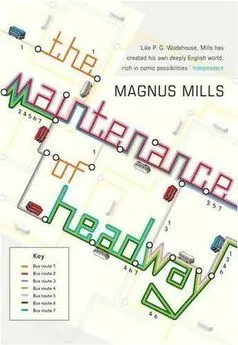Magnus Mills - The Maintenance of Headway
- Название:The Maintenance of Headway
- Автор:
- Жанр:
- Издательство:Bloomsbury UK
- Год:2009
- ISBN:нет данных
- Рейтинг:
- Избранное:Добавить в избранное
-
Отзывы:
-
Ваша оценка:
Magnus Mills - The Maintenance of Headway краткое содержание
It's a matter of procedure,' I explained. 'Strictly for the record. You don't get sacked from this job unless you did what Thompson did.' 'What did he do then?' 'We never mention it.' In Magnus Mills' brilliant short novel he transports us into the bizarre world of the bus drivers who take us to work, to the supermarket, to the match and home again. It is a strange but all too real universe in which 'the timetable' and 'maintenance of headway' are sacred, but where the routes can change with the click of an inspector's fingers and the helpless passengers are secondary. The journey from the southern outpost to the arch, the circus and the cross will seem as familiar as your regular route, but then Magnus Mills shows you the almost religious fervour which lies behind it, and how it is fine to be a little bit late but utterly unforgivable to be a moment early. 'To write one unique book is a rare achievement. The ability to produce several is truly special.' Independent
The Maintenance of Headway - читать онлайн бесплатно полную версию (весь текст целиком)
Интервал:
Закладка:
“You’re five minutes early,” he said at length. “Why’s that?”
I had no hiding place. The evidence was plainly visible: namely, me and my bus, five minutes earlier than we should have been.
“There’s no excuse for being early,” I said in a resigned way. “I suppose you’re going to book me.”
Mick gazed at me for a long time before he spoke again.
“As a matter of fact I’m not going to book you,” he said. “Instead I’m going to offer a word of advice.”
“Oh yes?”
“Tell me something,” he continued. “Do you believe in the maintenance of headway?”
“Of course,” I said.
“Truly believe?”
“Yes,” I answered. “Why do you ask?”
“Because you’ve recently been associating with a known dissident.”
“You mean Edward?”
“I’m not saying who,” Mick rejoined. “Merely that you seem to have been led astray by this individual.”
“But he’s my friend.”
“Friend or no friend,” said Mick. “You should keep well away from him. Not only for your own sake, but for the sake of the entire bus service.”
“This is ridiculous,” I protested. “Edward is a busman through and through. He’s only seeking improvement by alternative methods.”
At these words Mick appeared to undergo some sort of electric shock. His face went completely blank and the pupils of his eyes dilated. Furthermore, he ceased breathing for several seconds. When at last he spoke again his voice was cold and flat. “There are no alternative methods,” he said. “The only true path is the maintenance of headway.”
A long silence followed, during which the bleak winds of night played around the idling bus. Sensing I may have pushed the argument too far I decided to attempt a compromise.
“Alright,” I offered. “I’ll try not to be early tomorrow night.”
Mick, meanwhile, was quickly recovering his composure.
“Give me your log card, will you?” he said.
I handed it over and he wrote something in the ‘remarks’ box. Then he passed it back and vanished into the darkness.
I peered at the card. Mick had written only one word: ADVISED.
§
By the next evening the weather had begun to deteriorate. Yesterday’s sunshine was rapidly forgotten as heavy rain moved in from the west. The prospects for rush-hour travellers was formally classified as ‘grim’. Not only did they have to endure the usual torments of jostling crowds and packed buses: now they had to contend with repeated downpours and the resulting puddles everywhere. As the drains reached capacity I watched the people’s struggles from my warm, dry vantage point. In these conditions the job of a bus driver suddenly came into its own. Waiting passengers were genuinely pleased to see us when we arrived. They regarded the bus as a safe haven from the rain and clambered thankfully aboard. Reality returned when they got off again (especially if they’d left their umbrella behind).
By late evening, however, the constant rain was beginning to cause problems for some drivers too. About half past eleven I was working my way towards the southern outpost when the cab radio crackled into life.
“We’ve had a bus gone missing from our radar screen,” announced the controller. “I’m looking for running number three: can I have a response please?”
(They didn’t really have a radar, of course: this was simply a figure of speech.)
After a short delay another voice could be heard.
“Running number three receiving,” it said. “Over.”
I didn’t recognise the voice, and therefore guessed it must belong to the new driver. It was most unusual to be able to hear both sides of a conversation and I presumed the radio was stuck on an open channel. (I wasn’t sure whether this was due to the weather.)
“What’s your location, number three?”
“About a mile from the southern outpost,” came the reply. “Heading north.”
“What’s happened?”
“My windscreen wipers have packed in. I can’t see to drive so I’ve had to stop.”
“What have you done with your people?” enquired the controller.
“They’re still here with me,” said the new driver. “I keep telling them there’ll be another bus along in a minute, but it’s almost half an hour now and there’s no sign of one.”
The poor bloke sounded quite desperate. It was an unenviable predicament for a driver to be marooned with a load of passengers. Why, I wondered, hadn’t the next bus arrived to take them off his hands? I got my answer a few minutes later when I came upon Cedric, parked at the side of the road with his hazard lights flashing. I pulled alongside him and asked what the trouble was.
“The back doors keep opening and closing of their own accord,” he answered. “This bus isn’t going anywhere.”
Behind him I could just discern the doors swishing open, then closed, then open again.
“There’s another driver stranded up the road as well,” I remarked.
“Yeah,” said Cedric. “I heard it on the radio.”
I bade him farewell and continued on my way. This was beginning to look very bad. A little further along I passed the stricken northbound bus. Inside was a group of about thirty passengers, along with a very sorry-looking driver. The rain now seemed even heavier than before.
What I couldn’t quite work out was how this new recruit came to have so many people on board in the first place. Normally on a wet night like this there would hardly be anybody bothering to travel. Even allowing for the long gap between buses it was an uncommonly large number. The only conclusion I could draw was that the new driver had been running late even before his windscreen wipers stopped working. He had plainly fallen victim to the Law of Cumulative Lateness: late buses always carried more passengers; therefore, once a bus was late it could only become later still. Now, it seemed, his lateness was compounded beyond redemption.
What was also becoming clear was that the next bus in the sequence was mine. The three other functioning buses were somewhere at the northern end of the route, their drivers probably unaware of the critical situation in the south. The stranded driver had assured his people that another bus was coming to save them from their plight, and in a sense he was correct. Yet prophesying buses was a perilous exercise. I still had to complete my southbound journey before I turned around and headed the other way again. The bus he had foretold would be a long time coming.
Eventually I arrived at the southern outpost and paused briefly. There were no ‘intending passengers’ at the bus stop; neither were any officials to be seen. The absence of Mick Wilson and his comrades on such a horrid night was quite noticeable: inspectors of buses, I’m afraid to say, were merely fairweather friends.
A few moments later I set off north. By my estimate the people in the faulty bus had been waiting for almost forty-five minutes when at last I approached. I could see their anxious faces peering through the rear-window as I drew up. Most anxious of all, of course, was their driver. Frantically, he leapt from his bus and began flagging me down, thinking perhaps that I wasn’t going to stop.
I halted and he ran over to my window.
“Thank goodness you’ve come,” he said. “It feels like I’ve been with this lot forever.”
“Well, it’s all over now,” I replied. “Do you want to transfer them?”
“Yeah, please.”
Quickly he returned to the other vehicle. Then, in the pouring rain, I watched as he led his people to the promised bus.
Eleven
“There’s no excuse for being early,” said Breslin.
“No, I suppose not.”
“None whatsoever.”
“No.”
“It is forbidden.”
“Yes.”
Breslin had surprised Jeff, Davy and me by unexpectedly joining us at our table. It was rare for him to make an appearance in the canteen, let alone sit down with the drivers, yet here he was: he’d even forked out and bought us a mug of tea apiece.
Now he sat silently beside us, holding his black peaked cap in his hands and turning it gradually round and round. The conversation during the past few minutes, needless to say, had been quite stilted. Initially it wasn’t too difficult: Breslin had begun by telling us of the latest developments with the articulated bus. Apparently, the new vehicle had been fully approved by the Board of Transport and was now ready to enter regular service. His personal opinion of the bus was ambiguous. Yes, he said, it would carry a lot more people; but, no, he certainly didn’t like the look of it. There then followed some general observations about how drivers were always suspicious of new buses: he recalled that even the VPB had been greeted reluctantly at first. After this, however, Breslin’s manner seemed to become more sombre. Something was clearly playing on his mind, and suddenly, for no obvious reason, he began reciting his standard litany. There was, he repeated, no excuse for being early. Oddly enough, I wasn’t sure whether he was trying to convince us, or himself.
He continued rotating his cap until he came to his gilded badge of office, which he examined closely for a long while, as if it held some significant meaning.
At this juncture, Jeff attempted to lighten the mood. “What if a bus was already early when you took it over?” he suggested. “That would be a valid excuse.”
Breslin gave no sign of having heard what Jeff said. He just continued studying his badge.
Davy, I noticed, had begun to turn quite pale. He evidently regarded Breslin’s presence as a sort of trial by ordeal. For my part, I was beginning to wonder what all this was leading up to.
Eventually, Breslin broke the silence.
“I take it you’re all familiar with the maintenance of headway?” he said.
“Yes,” we each replied.
“And you understand there is a subtext?” he continued. “Namely, the separation of buses.”
We all nodded.
“Well, obviously we have to separate buses,” Breslin declared. “Stands to reason: otherwise they’d all turn up in clumps.” He gave a long sigh. “The trouble is, some of these young inspectors don’t realise there needs to be a certain amount of slack in the system. They’ve started taking matters to extremes. They don’t seem to grasp that strictly applying the letter of the law is…”
Breslin faltered. He appeared to be lost for words.
“Impracticable?” I offered.
“Impossible,” said Breslin. He shook his head slowly, and sighed again. “The maintenance of headway is not an iron rule,” he announced.
“What is it then?” Jeff enquired.
“It’s merely a guiding principle,” said Breslin. “The function of inspectors is to act as lubricants in the mechanism. We were never meant to be oppressors; we’re supposed to assist drivers in carrying out their duties. When exigencies arise we make appropriate adjustments. For most of the time, though, it’s a simple case of give and take. Words such as ‘cooperation’ and ‘tolerance’ come to mind. Yet recently certain upstarts have emerged from our ranks whose aim apparently is to interfere wherever possible. They’re threatening to spoil everything. They wish to turn the arch, the circus and the cross into their own personal fiefdoms. And the maintenance of headway is their creed.”
He glanced at his watch, stood up and walked away from the table, leaving the three of us to ponder his words.
“Blimey,” murmured Davy. “I never thought I’d hear him talk like that.”
“Nor me,” I said.
Читать дальшеИнтервал:
Закладка:





![Джеймс Купер - Пионеры, или У истоков Саскуиханны [The Pioneers, or The sources of the Susquehannah]](/books/1066142/dzhejms-kuper-pionery-ili-u-istokov-saskuihanny-t.webp)




